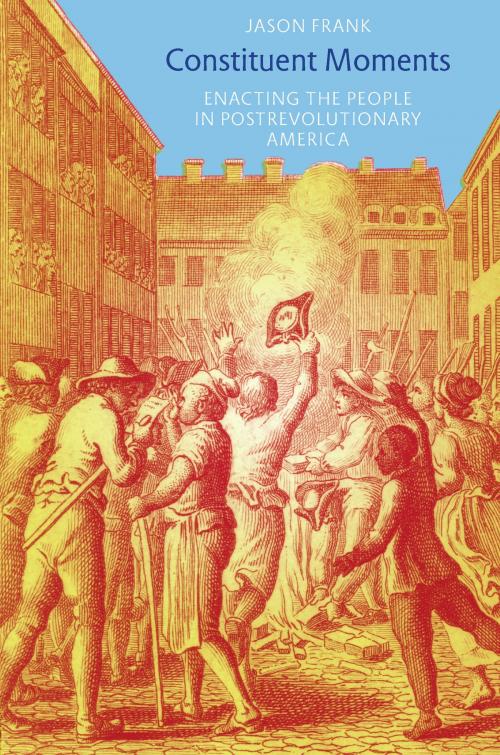Constituent Moments
Enacting the People in Postrevolutionary America
Nonfiction, History, Americas, United States, Revolutionary Period (1775-1800), Social & Cultural Studies, Political Science, Politics, History & Theory, 19th Century| Author: | Jason Frank | ISBN: | 9780822391685 |
| Publisher: | Duke University Press | Publication: | January 4, 2010 |
| Imprint: | Duke University Press Books | Language: | English |
| Author: | Jason Frank |
| ISBN: | 9780822391685 |
| Publisher: | Duke University Press |
| Publication: | January 4, 2010 |
| Imprint: | Duke University Press Books |
| Language: | English |
Since the American Revolution, there has been broad cultural consensus that “the people” are the only legitimate ground of public authority in the United States. For just as long, there has been disagreement over who the people are and how they should be represented or institutionally embodied. In Constituent Moments, Jason Frank explores this dilemma of authorization: the grounding of democratic legitimacy in an elusive notion of the people. Frank argues that the people are not a coherent or sanctioned collective. Instead, the people exist as an effect of successful claims to speak on their behalf; the power to speak in their name can be vindicated only retrospectively. The people, and democratic politics more broadly, emerge from the dynamic tension between popular politics and representation. They spring from what Frank calls “constituent moments,” moments when claims to speak in the people’s name are politically felicitous, even though those making such claims break from established rules and procedures for representing popular voice.
Elaborating his theory of constituent moments, Frank focuses on specific historical instances when under-authorized individuals or associations seized the mantle of authority, and, by doing so, changed the inherited rules of authorization and produced new spaces and conditions for political representation. He looks at crowd actions such as parades, riots, and protests; the Democratic-Republican Societies of the 1790s; and the writings of Walt Whitman and Frederick Douglass. Frank demonstrates that the revolutionary establishment of the people is not a solitary event, but rather a series of micropolitical enactments, small dramas of self-authorization that take place in the informal contexts of crowd actions, political oratory, and literature as well as in the more formal settings of constitutional conventions and political associations.
Since the American Revolution, there has been broad cultural consensus that “the people” are the only legitimate ground of public authority in the United States. For just as long, there has been disagreement over who the people are and how they should be represented or institutionally embodied. In Constituent Moments, Jason Frank explores this dilemma of authorization: the grounding of democratic legitimacy in an elusive notion of the people. Frank argues that the people are not a coherent or sanctioned collective. Instead, the people exist as an effect of successful claims to speak on their behalf; the power to speak in their name can be vindicated only retrospectively. The people, and democratic politics more broadly, emerge from the dynamic tension between popular politics and representation. They spring from what Frank calls “constituent moments,” moments when claims to speak in the people’s name are politically felicitous, even though those making such claims break from established rules and procedures for representing popular voice.
Elaborating his theory of constituent moments, Frank focuses on specific historical instances when under-authorized individuals or associations seized the mantle of authority, and, by doing so, changed the inherited rules of authorization and produced new spaces and conditions for political representation. He looks at crowd actions such as parades, riots, and protests; the Democratic-Republican Societies of the 1790s; and the writings of Walt Whitman and Frederick Douglass. Frank demonstrates that the revolutionary establishment of the people is not a solitary event, but rather a series of micropolitical enactments, small dramas of self-authorization that take place in the informal contexts of crowd actions, political oratory, and literature as well as in the more formal settings of constitutional conventions and political associations.















